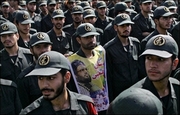by Laurent Lozano Thu Aug 23, 4:19 AM ET
WASHINGTON (AFP) - The United States risks elevating tensions and is not likely to achieve much by declaring Iran's Revolutionary Guards a "terrorist" group, a prominent Iranian dissident who co-founded the Guards said.
Mohsen Sazegara, who was a high-ranking Tehran official before turning against the government, told AFP in an interview that the US move, reported to be in the works last week, could spark a backlash, stirring up more turmoil in places where Washington accuses them of terror activities, including Iraq, Afghanistan and Lebanon.
Now a research fellow on Iran at Harvard University, Sazegara also said that he doubted blacklisting the Revolutionary Guards would force any change in the regime of President Mahmoud Ahmadinejad.
"The relationship between Iran and the United States will go one more step ahead toward military confrontation and the situation will become more dangerous, because the Revolutionary Guards is now one of the most powerful organizations in the politics of Iran," he said.
Sazegara, 52, is in a unique position to know about the secretive group he describes as the most powerful institution in Iran.
He held high positions in the Tehran regime after the 1979 revolution, including a key role in setting up the Revolutionary Guards that year. He describes it as now a huge political force of its own.
"The Revolutionary Guard ... is at the same time a political party, it is like an army, a security organization, a secret service, a huge complex of companies."
Domestically, he said, they operate a militia, the Bassidj, for suppression. Outside the country, they operate through the Quds force, which is out of Ahmadinejad's control.
"This is a force that is involved in Iraq, or Lebanon, or Afghanistan, or Palestine, any place in the world," he said.
"Not only the foreign ministry of Iran; even the president does not know what the Revolutionary Guards does outside of Iran. They directly report to the leader," he said, referring to Grand Ayatollah Ali Khamenei.
He described the group as having built sweeping economic power since the 1990s. "They started to run several companies and right now many people believe that the Revolutionary Guards own more than 100 companies .... in general contracts of gas and oil, plants, extraction projects.
Under Khamenei, they pushed deeply into politics, playing a key role in Ahmadinejad's rise.
"Many of the members of cabinet and parliament are members of the Revolutionary Guards ... many of the top managers of the country are from the Revolutionary Guards."
Sazegara, who distanced himself from the government in 1989 and did four stints in jail for his activities as editor of a reformist journal, said there is room for some pressure on Iran.
"It's hard to say what is the main intention of the United States," he said, noting that a minority of the US leadership, including Vice President Dick Cheney, have threatened a military strike on the country.
"So far although we have had two resolutions of the UN Security Council, they are not strong resolutions, they don't go for the main sources of power of this regime.
"Whatever the United States has done solely is more effective. Striking the banking system is causing a lot of problems for the merchants and industries of Iran, in the private and public sectors."
However, he insisted, "blacklisting the Revolutionary Guards is not enough to push them to a reasonable policy."
"Everything must be solved by negotiations. But in any negotiation you have to show your power too. You have to show the carrots and the sticks, you have to show that you are serious too. Otherwise Iran just wastes time."
Sazegara, who left Iran and went to Harvard in 2005, said that the Guards themselves are not all that content with Ahmadinejad, and that international pressure over human rights could have an impact on his government.
"What (Iranians) expect from the international community is to put pressure on this regime to help the people of Iran in their struggle for democracy and human rights.
"Any sanction against Iran of course creates problems for the people. But the people of Iran are ready to tolerate the difficulties if they are sure that the international community goes toward a kind of Helsinki process, if they establish some link between the sanctions and the human rights and democratic issues in Iran."
